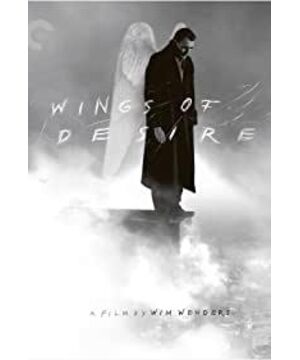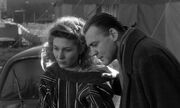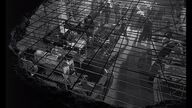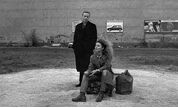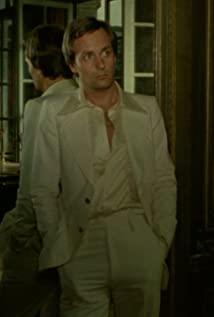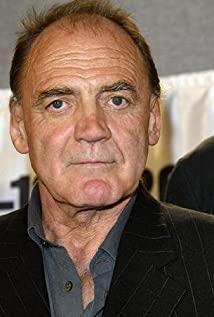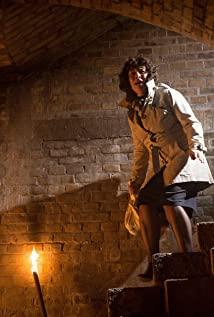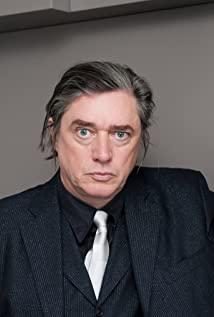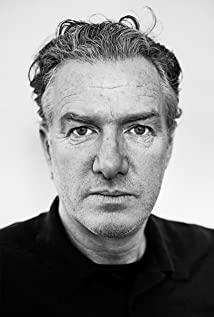"When a child is a child,
always waving his arms when walking,
Think of ditches as small streams, trickles as large rivers, and puddles as seas. "
Wenders' films are poetic. This poetry is not only the texture of the film and the temperament of the characters, but also comes from the appearance of the poem itself in the film: the beginning and end of the film are the sound of the pen rubbing the surface of the paper, the words emerge, The story unfolds or ends. Stories are filled in the gaps of poetry, even as footnotes in poetry. Wenders' first feature-length feature film was adapted from Peter Handke's novel Goalkeeper's Anxiety About Penalty Kicks. The original's narrative style is extremely sensitive - aimless people are pushed into absurd events, All order fell apart, leaving only broken perceptions to piece together a world on its way to the end-all of which seemed to reveal some kind of conscious anxiety, routine-accidental-disorder-escape became a fatal cycle of characters, escape is consciousness The beginning of the past and the future is also the end of the past and the future. After clarifying the absurdity of the present, it is difficult to break free from the predicament that there is no way to go. Therefore, only the absurdity is brought to the extreme as a form of resistance. But this is the predicament of man, not of God; and "Under the Berlin Sky" is an attempt to observe man's predicament from the perspective of an angel, especially when the angel chooses to fall into the world, the proposition of man and the proposition of God are integrated into one. It seems to have reached the perfect end of the love between angels and people, but in fact it is an interpretation of "living towards death" - the angel died as a "non-human" identity, and he completely accepted the life of "human" and used his divinity. Death in exchange for the growth of human nature, although entering the identity of "human" means that one day the physical body will inevitably disappear, that is, countless moments will become the rush towards death, but it will also be exchanged for the rebirth of perception and sensory improvement. wake.
"When a child is a child,
He doesn't think he is a child,
All is life-giving to him,
All life is the same. "
The angels were initially just two bystanders: Cassirer and Daniel. They hovered over the post-war Berlin day and night, with invisible wings behind them, occasionally resting on the huge statues in the city, and more wandering in the library to listen to the inner monologues of all kinds of people. What they are witnessing is the "repetition" of the human world. All joys and sorrows will lead to the moment of ending. Life, life and death are the three nodes of each person's linear time view - starting point, continuation and death. Although this repetition is not monotonous, each person or era tells their living story, "they are all full of life". Daniel "looked at" an old man on the spiral staircase of the library, and walked in different directions on the steps after a brief pause; the desperate man collapsed on the high building, and the angel touched his shoulder but could only see him jump down; occasionally There are children who can see the traces of angels, and wings can only be recognized in innocence, and the disappearance of innocence one day leaves the angel in a situation of always loneliness. "All life is the same" The river of life flows in the same direction, "Time heals everything, but what to do when time is the disease itself?" Healing is also synonymous with forgetting, it makes all senses feel Being looked at with suspicious eyes, the urge to feel sad, moved, and love is temporary. Time erodes all emotions, but does not return the essence of human beings to people-because human beings are supposed to collide with sensibility and rationality. product, and tragicomedy is the overflow and continuation of human emotions for a long time. The angel stands on a high place overlooking the human world, which also expresses his separation from human beings: human beings are full of emotions, perceptual, chaotic and intricate; angels are stable, rational, and purely alienated. Daniel's decision to fall into the world is actually breaking this distinction. He doesn't want to be just a spectator, he wants to experience the real temperature and see the colorful colors.
"When a child is a child,
There are often problems like this,
Why am I called me and not you?
Why am I here and not there?
When did time begin,
And where does space end?
Isn't living in the sun more than a dream?
What I saw, heard, smelled,
Isn't it just a reflection of the real world?
Are there really evil, or full of malicious people?
how to do it,
I was me before I was born,
not after my death,
How can I be the only me,
instead of many me? "
The above is one of my favorite poems in the whole movie, and he made me realize that the "child" in the poem is not a "child" in particular, but a collection of many childhood questions in a broad sense. No matter when I was a child or now, when I see people in a hurry on the road, I always imagine where their destination is. All the tall buildings are full of stories that have not yet been written, and all the cars with people are heading for the unknown. In the direction of the road, all the people who are on the road are waiting for another person. I was filled with these imaginations on the boring road to and from the remedial class. Can remember the original questions "Why am I necessarily, without choice?" "Why am I what I am?" "Why am I here and not there?" Perhaps because it is a mystery that is doomed to be unanswered, I Lost interest in probing it too; they surged up like emotions and then dissipated quickly, melting into the order of everyday life like other whims—until I decided to carry it with me. At that time I felt my life was dark, dull, barren, ruthlessly dominated by a single goal, and the street scene was full of color - all the blocks of color flowing in the sun, walking down the street , go to the center of vitality. In the film, the contrast of colors is also used to distinguish the different lives of angels and people: the world of angels is black and white, because of alienation and insensitivity, so the color is constant; the world of people is colorful, because of enthusiasm and complexity, so colorful. Black and white need a certain medium to become color. In the movie, Daniel meets the "angel" of the circus. When Marion wearing fake wings made of feathers flies over his head on a swing, Daniel's perspective in the movie is the first. Once from overlooking to looking up, the change of perspective is not only a hint of Daniel's fall into the world as an angel, but also a sign that Daniel, who has an emotional experience at the beginning, realizes "love". The verb paired with love is often "to fall", and to fall implies the occurrence of an event that is intrusive, which brings disorder into everyday life, an everyday deviance and a new order. germination. The break-in of the incident often implies that the people in it have no choice but to be at the mercy of the incident - but Daniel's fall was a choice made after watching the world for a long time, and his compassion starts from listening to people's hearts. After the narration, he began to brew. He looked at the elderly, children, the frustrated... with different eyes, and he already had a "personality" when he looked at the world.
Benjamin had founded a literary journal, The New Angel, in the 1920s, the name of which is often thought to be influenced by his favorite Paul Klee painting, The New Angel, Benjamin in the preface "According to the Talmud legend, at every moment, countless groups of angels are constantly being created, to sing their hymn before God, then leave and disappear into nothingness." Angels are the message The messenger, and the secret self; the angel as an expression symbol is also the dichotomy of humanity and divinity in the self. Maybe the angel does not disappear into nothingness, but looks at the world, and every change between angel and human is human. The breaking of the present after weary of self-situation - "I" walks into infinite identities, and finally realizes that life "only happens once, so it becomes eternity".
View more about Wings of Desire reviews


